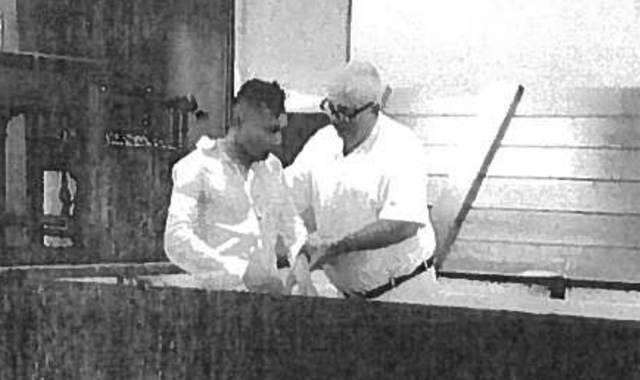Abdul Ezedi: Documents reveal why Clapham chemical attacker was granted asylum - as pictures show him being baptised

Documents revealing why Clapham chemical attacker Abdul Ezedi - a convicted sex offender - was granted asylum have been made public for the first time, while Sky News has obtained pictures of him being baptised in church.
Ezedi attacked a woman and two children with an alkali on a street in south London in January.
The 35-year-old, from Afghanistan, had twice been refused asylum by the Home Office after arriving in the UK on the back of a lorry in 2016.
The second refusal was overturned by a judge in an appeal hearing in October 2020 because of Ezedi's claim to have converted to Christianity.
A suggestion that he would be at risk of persecution if he returned to Afghanistan was supported by a vicar.
Judge WK O'Hanlon, who granted Ezedi asylum at Newcastle Immigration Court in November 2020, said in his judgment that "the most compelling evidence was that of the former Reverend Merrin".
The details of that hearing were not initially made public but Sky News can now reveal exactly what happened after receiving the court documents in full.
'Baptised by total immersion'
A letter written to the court by Reverend Roy Merrin, a retired ministry team leader at Grange Road Baptist Church in Jarrow, dated 28 August 2018, reads: "I have known Abdul since February 2016, during which time he has attended regular worship services at Grange Road."
"Abdul has attended an Alpha Course organised by the church and, as a result of him coming to faith in the Lord Jesus Christ, has been baptised by total immersion."
"Abdul has established a good relationship with the other Church members, and is always willing to help as required. Apart from that, Abdul has been ready to share his faith in Christ with non-Christians."
Reverend Merrin also told the court hearing when he appeared in person that he had previously attended tribunals for four other asylum seekers all of whom were successful in their appeals.
Sky News has contacted Reverend Merrin, who said he had no comment to make.
Also submitted to the tribunal hearing were photos from Ezedi's baptism on 24 June 2018 as well as pictures of him engaging in what his legal team described as "street ministry".
'Male supporter' required at church
But also included in the documents was an undated "safeguarding contract" in relation to Ezedi, drawn up by "Baptists Together", stating: "This agreement is being put in place because of a conviction of sexual assault and exposure."
Among other conditions, Ezedi had agreed to "not enter the church without [his] male supporter being present" and "will only come to church for Sunday service".
It was while living in the UK as a failed asylum seeker that Ezedi had pleaded guilty to one count of sexual assault and one count of exposure at Newcastle Crown Court in January 2018. He was handed a suspended prison sentence and put on the sex offenders' register.
Read more:
The 'traumatising' search for dead bodies in the Thames
Two 'unexpected' bodies' found during search for Clapham suspect
Ezedi twice refused asylum
There is no mention of those convictions in the tribunal judgment that granted asylum to Ezedi. The court documents have also revealed more about why Ezedi had twice previously been refused asylum.
Ezedi's initial asylum claim after his arrival in 2016 was on the basis that he feared persecution because of his ethnic group. During that claim, he was described as a Shia Muslim.
The claim was rejected by the Home Office in May 2016 and further rejected on appeal in February 2017. By June 2017, Ezedi had run out of appeal options and was living illegally in the UK.
It was in March 2019 that Ezedi submitted a new asylum claim to the Home Office, saying he had converted to Christianity and would face persecution on that basis if he returned to Afghanistan.
That claim was refused by the Home Office in March 2020 because it did not believe his conversion was genuine.
Asylum seekers have the right to appeal Home Office refusals, and Ezedi and his lawyers then compiled the bundle of documents that were put before the judge for the tribunal hearing that led to him being granted asylum.
A Home Office spokesperson said: "All asylum claims are carefully considered on their individual merits in accordance with the immigration rules.
"This means that religious conversions do not guarantee a grant of asylum.
"We have engaged with a wide range of stakeholders to help us to improve our policy guidance, training for asylum decision makers, and to ensure we approach claims involving religious conversion in the appropriate way."
Baptists Together told Sky News: "Baptists Together did not corporately support or sponsor Abdul Ezedi's asylum application. A personal letter of support commenting solely on Abdul Ezedi's observed faith journey was written by a retired Baptist minister.
"The safeguarding contract was a separate issue and was agreed between the church and Abdul Ezedi, with guidance from local and regional safeguarding leads using our national template document of the time.
"This was to show the church had sufficiently risk assessed Abdul Ezedi's attendance at church, ensuring the safety of the congregation and considering if it was appropriate for him to attend.
"The Home Office make the final decision on asylum applications and have access to full criminal records data to enable them to do this."
Additional reporting by Nick Stylianou, communities producer

 Yahoo News
Yahoo News 
